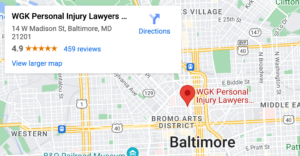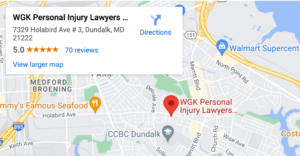
You have probably heard about people who have gotten insurance settlements after a car accident. If you have never filed an insurance claim, you might worry that insurance companies will use settlements to deprive you of your day in court.
But settlements often represent the best outcome for both you and the insurer. And a good negotiation strategy can ensure that you receive fair compensation in your settlement agreement.
Here is some background about settlements and five things that you should know before you sign any car accident settlement agreements.
Table of Contents
How Insurance Companies Process Claims

Maryland uses a fault-based car insurance system. After a car accident, you file a claim with the at-fault driver’s auto insurer.
Your claim will include a description of the accident and the damages you suffered.
You will include information to support your claim, such as:
- Accident reports
- Medical records
- Pay records
- Medical bills
The insurer assigns a claims adjuster to investigate your claim. Under Maryland law, the adjuster must make a fair, prompt, and good faith attempt to settle the claim if you proved that the policyholder caused the accident.
At the same time, the insurer has a duty to its shareholders to maximize profits. Most of the time, the duty to the shareholders wins.
The insurer will use a variety of tactics to try to push you into a settlement for less than the value of your case.
They may attempt to:
- Blame you, at least in part, for the crash
- Slow down the claim as much as possible
- Deny or reduce the value of your claim
To get a fair settlement, you and your injury lawyer will negotiate with the insurer.
Negotiating a Settlement Agreement
To negotiate a fair settlement, your lawyer will evaluate your case. The lawyer will assess your legal arguments. For maximum leverage, you need good evidence of the other driver’s negligence. Your attorney will also assess your damages so you know whether the offer you receive is fair.
During the negotiation, your lawyer will present factual and legal arguments to try to get a better offer.
Some of the reasons an insurer will deny a claim or give a low offer include:
- You caused or contributed to the cause of the accident
- Your treatment was unnecessary
- You claimed pre-existing injuries
- You failed to explain why you missed work
Maryland is one of the states with harsh standards for shared negligence. Under Maryland’s contributory negligence law, you lose the right to seek any compensation if you bear any portion of fault for your injuries.
If an insurer rejects your claim because of your actions, your lawyer can use the facts of the case and Maryland law to explain why your actions did not constitute negligence.
Having a skilled lawyer can make the difference between getting a settlement that covers your damages and getting nothing.
Five Things to Know About Car Accident Settlement Agreements
If your lawyer successfully negotiates a fair settlement agreement, you will discuss what the settlement covers and how it affects your case.
Here are five things to keep in mind as you decide whether to sign a settlement agreement:
1. A Settlement Is the Most Likely Resolution of Your Case
Only 3% of injury cases reach a trial verdict. The court dismisses 10% and accident victims drop 14%. But 73% of claims end with a settlement.
Insurers settle because juries usually do not like insurance companies. By settling, the insurer can avoid a huge jury verdict.
Settlements also benefit accident victims. Litigation can take years. A settlement puts money in your pocket faster than going to trial.
By negotiating a settlement, both sides avoid the unpredictability of a jury decision.
2. You Must Release Your Claims in a Settlement Agreement
When you sign a settlement agreement, you release all of your asserted and unasserted claims against the other party. This gives everybody finality in the case.
Suppose that the other driver crashed into you in a road rage incident, then got out of the car and punched you. When you settle with the insurer, you sign a release. This ends your claim for the crash and the punch, even though the insured was not liable for the punch. As a result, you will never again be able to sue for either the punch or the crash.
Similarly, the release will cover all injuries, known or unknown. Car crashes sometimes cause hidden injuries like torn cartilage or a brain injury.
After you sign the settlement, you cannot seek compensation for those injuries, even if doctors discover them years later.
3. The Settlement Agreement Might Not End All Cases
The settlement covers all your claims against the other parties to the settlement. But it does not cover non-parties.
Your injuries might have several causes. Perhaps another driver hit your vehicle. Maybe your vehicle rolled over because of a defective suspension. Maybe your doctor misread your chart and prescribed the wrong medication.
Each of these claims will have separate parties and insurers. If you settle the claim against the at-fault driver, your claims for product liability and medical malpractice will continue.
4. The At-Fault Driver’s Policy Limits Might Cap Your Settlement
The settlement offer from the insurance company might feel inadequate. But the insurer is only obligated to pay up to the coverage limits laid out on the policy.
Maryland requires all vehicle owners to carry:
- At least $30,000 for injury of one person
- At least $60,000 for injury of two or more people
- At least $15,000 for property damage per accident
If you are the only one injured in an accident and you suffer $40,000 in damages, the insurer can only cover $30,000 and the at-fault driver would then bear liability for the remaining $10,000.
In many cases, the at-fault driver might not have the resources to pay a judgment. As a result, taking the case against the driver to trial will delay your insurance settlement without getting any additional money. You may decide to settle for the policy limits and move on with your life.
5. Settlements Can Happen at Any Time
Insurers do not like to pay lawyers for cases they do not plan to fight. Filing a lawsuit can push the insurer to settle. But insurers can wait to settle until they have seen the evidence in the case or accounted for the jury’s reaction to the evidence.
The Role of a Lawyer
Injury lawyers have experience negotiating with insurers. As a result, injury lawyers can often settle your case faster and get a better settlement offer for you. Most importantly, insurers often avoid playing games with lawyers.
Your case might benefit from the negotiating skills offered by an experienced injury lawyer. To discuss how an injury lawyer can help with your car accident settlement agreement, contact a reputable car accident lawyer near you.


